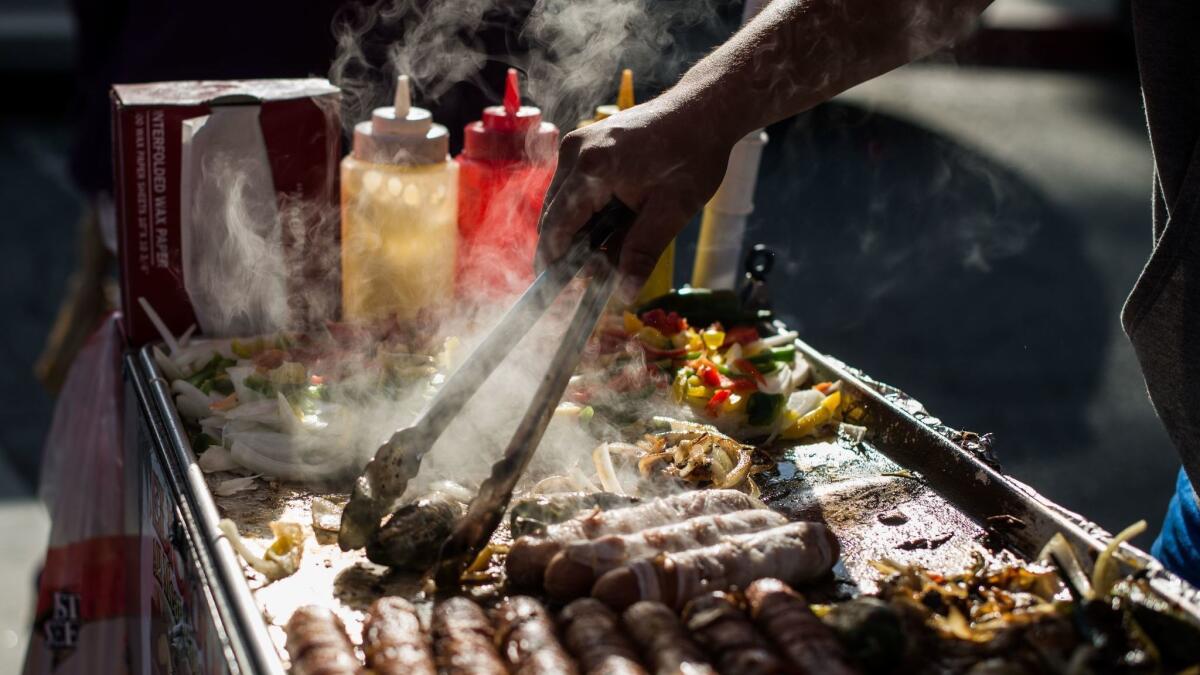Costa Mesa will reconsider street vending ordinance with fewer restrictions

- Share via
In a departure from neighboring cities, the Costa Mesa City Council decided Tuesday night to make a new sidewalk vending ordinance less restrictive for prospective vendors.
The council was tasked with amending the ordinance already on the books to comply with a state bill that then-Gov. Jerry Brown signed into law last year legalizing sidewalk vending and limiting local regulations, though it does allow restrictions based on “objective health, safety or welfare concerns.” The current Costa Mesa ordinance prohibits sidewalk vending in most of the city.
Instead of erecting many obstacles for street vendors — as the councils in Huntington Beach, Laguna Beach and Newport Beach have done — the Costa Mesa council elected 6-0 (with Councilman Allan Mansoor absent) to postpone voting on the new ordinance until it comes back with fewer restrictions.
“I’d like to see us open up opportunities for more businesses,” Mayor Katrina Foley said.
The other council members agreed and together examined the proposed ordinance for ways to reduce barriers for potential street vendors. City staff is expected to return at the next council meeting with specific changes.
The proposed ordinance would have required sidewalk vendors to pay for a permit and would have prohibited sidewalk vending anywhere in the city between 11 p.m. and 7 a.m. daily, unless within 500 feet of a business that is legally operating during those hours. It also would have restrictions on sidewalk vending near residences, businesses and public buildings and inside parks.
Councilwoman Sandy Genis said the original ordinance was initiated because of an issue in the 1990s with excess trash and noise from vendors.
“There were a lot of, sort of, ad hoc pushcarts,” Genis said. “People would borrow shopping carts from the market, get excess stuff from a dumpster and peddle it in the neighborhood.”
City Finance Director Kelly Telford estimated Costa Mesa had received two inquiries about sidewalk vending in the past year or so. She added that the city would create a map of available locations for street vendors interested in coming to Costa Mesa.
Sober-living decision delayed
The council also postponed a decision on an application for a sober-living home to continue operating in Costa Mesa.
Fellowship House, which has operated at 2412 Orange Ave. for more than four years, applied for a special use permit nearly three years ago. The facility houses 10 residents, plus a resident manager.
But it ran up against a city buffer rule prohibiting such facilities from operating within 650 feet of one another in residential areas. The permit application was denied by the director of development services and the Planning Commission, and Fellowship House appealed to the City Council.
The council Tuesday sent it back to the planning director on a 6-0 vote to consider revisions to the application.
Sober-living home operators have had a difficult time obtaining permits in Costa Mesa since the city introduced two ordinances in 2014 and 2015 placing restrictions on group homes. Facilities operating in the city at the time of the ordinances’ adoption were required to apply for permits to stay.
Planning Commission appointment
With another 6-0 vote, the City Council appointed Byron de Arakal to fill the spot on the Planning Commission that Carla Navarro Woods vacated last month when she moved.
De Arakal, a communications strategist, was serving as an at-large commissioner. The council’s vote moves him into a spot representing District 3 and opens his current seat for another appointment. Navarro Woods’ term runs until February 2023.
The Planning Commission reviews and acts on certain proposed projects and permit applications and advises the council on issues related to long-term growth and development.
All the latest on Orange County from Orange County.
Get our free TimesOC newsletter.
You may occasionally receive promotional content from the Daily Pilot.




